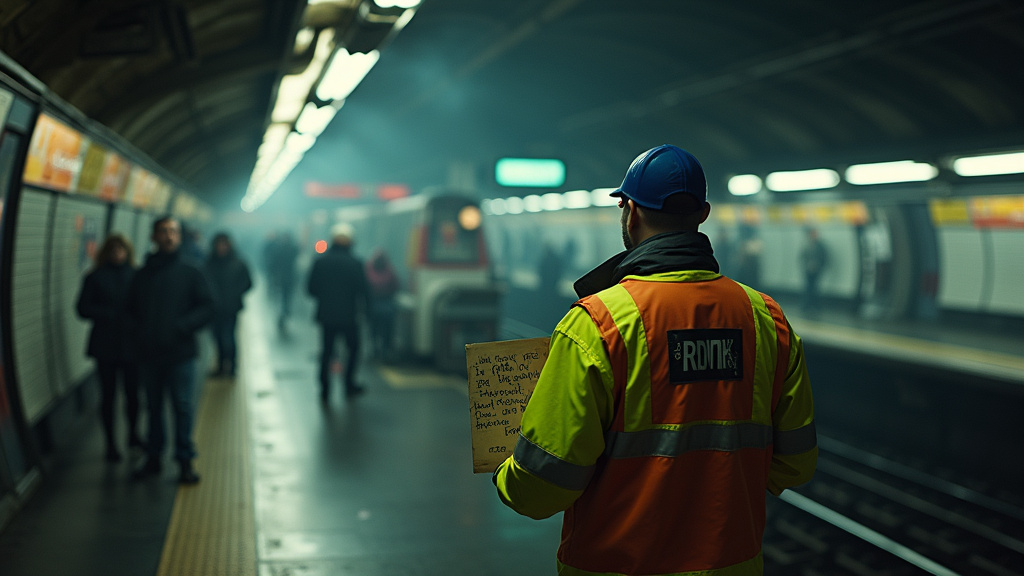London is set to face significant travel disruption as the Rail, Maritime and Transport (RMT) union announced a week of rolling strike action across the London Underground and Docklands Light Railway (DLR). The industrial action, which begins on Friday, September 5, and is scheduled to run until Thursday, September 11, threatens to bring major parts of the capital’s public transport network to a standstill, making this top news for commuters.
The Scale of Disruption: Dates and Affected Services
The RMT union has orchestrated a series of walkouts involving different staff groups on staggered days, aiming for maximum impact. While some members at the Ruislip depot will begin their 24-hour strike from 6 pm on Friday, September 5, the widespread network issues are expected to commence on Sunday, September 7.
Specific strike days include:
* Sunday, September 7: Track Access Controllers, London Underground Control Centre staff, Power/Control, and Emergency Response Unit (ERU) members will walk out.
* Monday, September 8 and Wednesday, September 10: Fleet engineers, station staff, and train drivers, along with other operational staff, will strike.
* Tuesday, September 9 and Thursday, September 11: Signallers, Service Control, and ERU members will undertake strike action.
Furthermore, Docklands Light Railway (DLR) workers, also represented by the RMT, will strike on Tuesday, September 9, and Thursday, September 11, over pay and working conditions. Transport for London (TfL) has warned of “severely disrupted” Tube services from Sunday, September 7, to Thursday, September 11, with “little to no service expected” on most lines.
Affected Underground Lines: All London Underground lines are anticipated to be impacted by the strikes, including the Bakerloo, Central, Circle, District, Hammersmith & City, Jubilee, Metropolitan, Northern, Piccadilly, Victoria, and Waterloo & City lines. Services that do manage to run between Monday, September 8, and Friday, September 12, are expected to start later than usual, with no service before 8 am.
RMT’s Grievances: The Core of the Dispute
The RMT union states that its members are taking industrial action due to London Underground (LU) management’s alleged refusal to engage seriously with their demands. Key issues at the heart of the dispute include pay increases, the need for better fatigue management, concerns over extreme shift patterns, and a push for a reduction in the standard working week. RMT General Secretary Eddie Dempsey highlighted the strenuous working conditions, stating, “Our members are doing a fantastic job to keep our capital moving and work strenuous shift patterns to make sure Londoners get to their destinations around the clock. Fatigue and extreme shift rotations are serious issues impacting on our members health and wellbeing.” The union also claims that previous agreements made with staff have not been honoured, fostering an atmosphere of distrust.
TfL’s Stance: An Unaffordable Demand
Transport for London (TfL) has countered the RMT’s demands, particularly regarding the reduction of the 35-hour working week, deeming it “neither practical nor affordable.” TfL has offered a 3.4 percent pay rise, which they state is in line with increases across the wider UK rail industry. The transport authority has expressed its commitment to fair treatment of employees and has been engaged in regular meetings with trade unions to address concerns. TfL negotiators were scheduled to meet with RMT union leaders in a bid to avert the strikes.
Wider Implications: Coldplay Reschedules and Commuter Chaos
The impending strikes are not only set to cause chaos for London’s millions of commuters but have also directly impacted major events. The global music phenomenon Coldplay has been forced to reschedule two of their highly anticipated Wembley Stadium concerts, originally planned for September 7 and 8. The band cited the impossibility of safely transporting over 80,000 fans to and from the venue without Tube services, which led to event licence issues. Their shows have been moved to September 6 and September 12, respectively, causing disappointment for many fans. This event makes the strike action a trending topic across UK news outlets.
Navigating London: Alternatives and Advice
While the Underground and DLR face severe disruption, other TfL services are expected to operate, though likely with increased passenger numbers. The Elizabeth line and London Overground will run normally, but commuters should anticipate much busier conditions. Buses will also continue to operate, although separate strikes by First Bus drivers in west, northwest, and southwest London will affect over 60 routes. TfL advises passengers to plan their journeys meticulously, check live updates, and allow for extra travel time. Walking and cycling are also recommended for shorter journeys. This story is a stark reminder of the critical role public transport plays in the daily life of London.
Looking Ahead: The Search for a Resolution
As negotiations continue between the RMT and TfL, there remains a possibility that a last-minute deal could be struck to call off the industrial action. However, with the union confirming overwhelming support for the strikes, Londoners are being urged to prepare for significant travel difficulties throughout the week. The outcome of these talks will be crucial in determining the extent of the disruption and the eventual resolution to this impactful news story.





